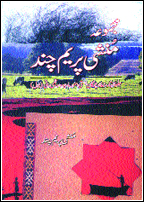






|
|

|
|

February 27, 2005
REVIEW: A man ahead of his times
 AS is true of almost all major happenings on the planet, the trendsetting Progressive Writers Movement did not come about out of the blue. Long before it made its mark in the mid-1930s, there were people laying the foundation, even if unconsciously, of what was to come. They swept established and, indeed, cherished literary trends off their proverbial feet.
AS is true of almost all major happenings on the planet, the trendsetting Progressive Writers Movement did not come about out of the blue. Long before it made its mark in the mid-1930s, there were people laying the foundation, even if unconsciously, of what was to come. They swept established and, indeed, cherished literary trends off their proverbial feet.
Dhanpat Rai, known to us all as Premchand, stood head and shoulders above most who contributed to the effort. It was in the fitness of things that he chaired the inaugural session of the movement in 1936 just months before he crossed over into eternity as if he had seen the culmination of a lifetime’s dream, and it was pointless to live beyond that. After all, he had been putting pen to paper for almost 35 years by then.
It is only fair to say that Premchand was some three decades ahead of his time. The three-volume collection of his work that now graces the shelves in bookshops around the country bear ample testimony to the assertion, for it contains every theme that was later explored and propagated by the Progressives. In fact, there is much more.
Born in 1880, the year that saw the maiden edition of Sarshar’s legendary Fasana-i-Azad, Premchand grew up in a remote town around what is now known as Vernasi. Though his father was a low-level functionary at the local post office, he had enough sense to make his son go for proper education from the very beginning. Having worked hard, it was no fluke that Premchand rose to the level of deputy inspector of schools, and would have gone much higher had it not been for his penchant for taking up real-life issues while wearing his writer’s cap.
As noted by Saleem Akhtar in his preface to this wonderful effort by Sang-e-Meel, Premchand’s first collection of short stories, Soz-i-Watan was seized and set on fire by the authorities back in 1909 as it ruffled quite a few feathers. Many a pen-name later, Premchand quit his official post so that he could concentrate on doing what he really wanted to. This was in 1921, and for the next 15 years till his death in 1936, Premchand wrote and wrote and wrote, leaving behind as many as 29 novels and 26 collections of short stories. Other than that he wrote dramas, personality sketches, biographies and what not.
The present collection featuring ten novels and as many as 118 short stories, spread over almost two-and-a-half thousand pages, bring out the whole range of masterpieces penned by Premchand. “Kafan”, “Maalkan”, “Na’ee Beewi”, “Gilli Danda”, “Shatranj Kay Khilari”, “Deendari”, “Leaderi Ka Paisha” stand out among the short stories in the sense that they represent Premchand’s treatment of human psyche, emotions and the prevailing misuse of religion and politics in society. Others like “Swaang” and “Baray Bhai Saheb” deal with the lighter side of man.
In terms of novels, they are all marked by strong characterization. From Hoori and Dhania of Gao-Dan to Ramnath, Jalpa and Zohra of Ghaban, they are all real-life and everyday characters, leaving Premchand under no compulsion to use fictional or dramatic characters in his work for a heightened effect. As the saying goes, nothing fascinates more than the fact, and apparently Premchand was in wholehearted agreement with the dictum.
Tareekh-i-Sindh
By Abdul Haleem Sharar Reprinted by City Book Point, Karachi. Available with Fazlee Sons Supermarket, Urdu Bazar, Karachi. Tel: 2212991342pp. Rs200
SHARAR is not a name associated with historical research. He is known as the man who gave classical Urdu literature a new direction by taking it away from the moralistic preachings of Deputy Nazeer Ahmad, and introducing the element of romance in Urdu novels. Even though Sharar’s romance was deeply entrenched in Islamic history, his efforts were still a certain distance away from being counted as historical research. The book in hand, however, is based on pure, extensive and rather interesting research done by Sharar on Sindh.
A widely read man, Sharar was a bit shocked to see the huge difference between the accounts narrated by Arab and Persian historians. In his words, it was a matter of much agony for him that most English historians had preferred to follow the Persian version while having conveniently ignored the Arab viewpoint.
Sharar then set out to make that account available for local historians to draw informed conclusions rather than leaning on what was already in hand. In the process, he shattered quite a few myths. For instance, the blunders pointed out by him regarding Chachnama’s account of the last days and death of Mohammad bin Qasim would still cause a few ripples in relevant circles.
Having been first published almost a century ago, the book was lost to the modern reader, but has now been dug out of the rubble, posing a serious challenge to the historians of today.
Majmooa Munshi Prem Chand (Novels-I)
ISBN 969-35-1417-3757pp. Rs900
Majmooa Munshi Prem Chand (Novels-II)
969-35-1466-1680pp. Rs750
Majmooa Munshi Prem Chand (Afsanay)
ISBN 969-35-1304-5928pp. Rs900
Reprinted by and available with Sang-e-Meel Publications, 25, Shahrah-e-Pakistan (Lower Mall),
PO Box 997, Lahore
Tel: 042-7220100; 7228143 Fax: 042-7245101.
Email: smp@sang-e-meel.com
|
|
|